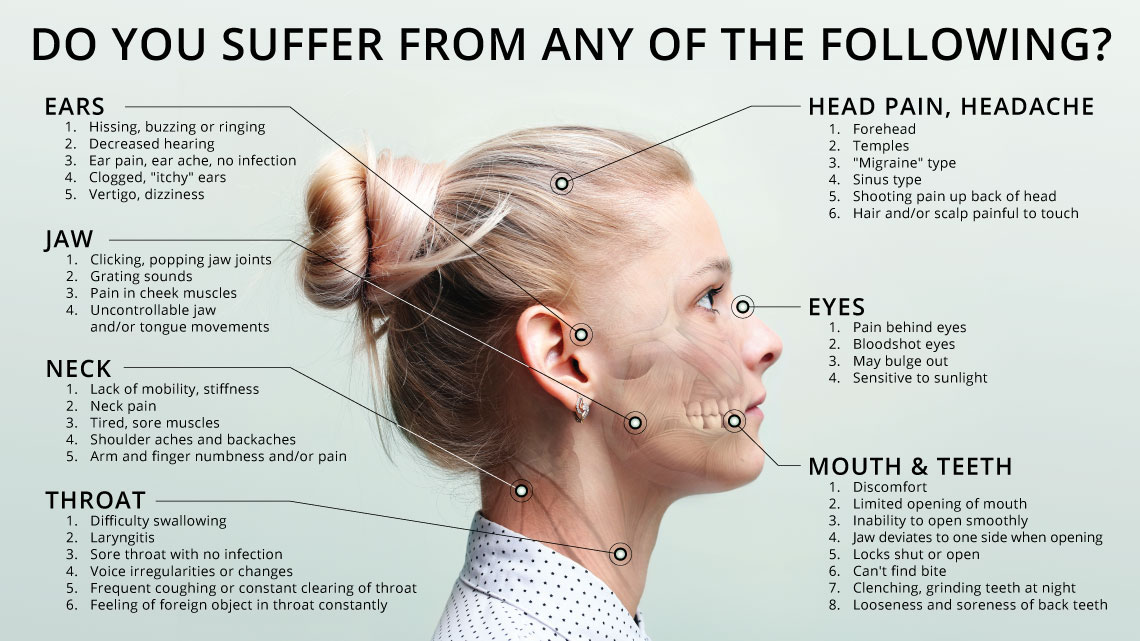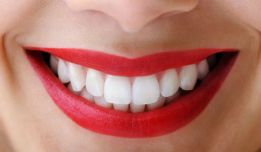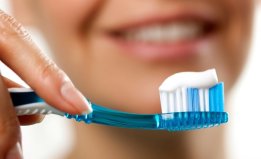The mandible, commonly known as the jaw, is the lower bone of the mouth. The joint where the jaw meets up with the side of your skull in front of your ears is one of the most used joints in the human body and is called the temporomandibular joint (TMJ).
Jaw pain can range in severity from mild discomfort during movements of the mouth to severe pain that affects actions such as eating or talking, leading to a significant decrease in quality of life.
What Cause Jaw Pain
The exact symptoms of any jaw pain will depend on the cause. Identifying the cause of pain is the first step to proper treatment and finding possible solutions for pain relief. Below are some causes of jaw pain:
Teeth grinding
Teeth grinding is one of the leading causes of jaw pain and can result in significant damage to your teeth and cause chronic jaw soreness or pain. Grinding refers to the process of clenching your teeth outside of the context of chewing. It most commonly occurs sub- or unconsciously such as during periods of stress or during sleep. The excessive use of the surrounding joint muscles can lead to jaw soreness and/or headaches.
Severe grinding can also significantly wear down the structure of your teeth, so it is important to go see a dentist for professional evaluation if you think you have been grinding. If you are unconsciously grinding your teeth while you sleep, your dentist may suggest making a specially fitted mouthguard to wear at night to avoid further teeth damage.
Temporomandibular disorder (TMD)
One of the most used joints in the human body is the temporomandibular join (TMJ). Any mouth movement will involve the TMJ including talking and chewing. Temporomandibular disorders (TMD) generally refers to any disorders affecting the TMJ, but usually involves malalignment between the cartilage, ligaments, and jawbone connecting with the skull.
Misalignment of the three can lead to the jaw making clicking noises when opening or closing the mouth. In more severe cases, it can cause the jaw to become stuck in an open position. A compromised TMJ or repetitive stress on the TMJ can lead to symptoms including pain around the ears and jaw, constant headache, dizziness, and chronic ringing in the ears.
Malocclusion (misaligned bite)
If your jaws are malocclused (ex. Overbite or underbite) or your teeth are misaligned, this may lead to a long-term development of uneven stresses being placed on the jawbone leading to pain and discomfort. Jaw malocclusion or teeth misalignment can be hereditary, caused by trauma, or due to missing teeth where others have “drifted” and become slowly crooked.
Trauma
Like any bone, your jawbone can still be broken or dislocated. Dental trauma from accidents, spots injuries, etc. to the jaw can lead to bruising, swelling, and pain.
Dental Problems
Problems affecting your teeth can spread to affect your jawbone and lead to jaw pain or soreness. This includes gum disease, cavities, or abscesses. Advanced gum disease and cavities can lead to jaw bone deterioration. This may add uneven stress on certain points of the jawbone during actions such as biting or chewing, and over time results in jaw pain and soreness.
Osteomyelitis
Osteomyelitis refers to bacterial infection of the bone. If the infection travels and affects your jawbone or the TMJ, it can result it jaw pain, fever, and facial swelling. Fortunately, this can be cured with a series of antibiotics. In severe cases where the bone has been significantly infected, surgery may be necessary to remove the infected bone.

Symptoms
Symptoms of jaw pain will vary depending on the cause and source of the pain. Common symptoms associated with jaw pain include:
- Joint and muscle tenderness
- Limited range of motion
- Chronic ringing in ears
- Earaches
- Headaches
- Dizziness
- Jaw locking
- Toothache
- Facial swelling
- Clicking or popping sounds
Treatments
Immediate Relief
Over-the-counter pain relievers like ibuprofen and acetaminophen can help reduce discomfort. Note that many pain relievers are classified under NSAIDS (Nonsteroidal anti-inflammatory drug) and include common drugs such as aspirin, advil, motrin, and more. Long-term use of NSAIDS can have significant side-effects.
Heat or ice pack application for 10 minutes can help relax overactive jaw muscles and relieve some pain.
Massaging the sore areas, neck, and the TMJ can also provide some temporary immediate relief. Pressing the sore areas with your index or middle finger in a circular motion for 5 to 10 rotations while your mouth is closed and then open can help relieve tension in your jaw.
Lifestyle Changes
Stress Reduction: Clenching is a common cause of jaw clenching, and ultimately soreness. if you find yourself chronically stressed, there can be non-pharmaceutical methods of stress-relief to try incorporating into your daily life.
Avoid tough and chewy foods: Excessive use of jaw muscles through eating/chewing chewy, tough, or crunchy foods can also strain your TMJ and lead to pain and discomfort in your jaw. This can include foods like jerky, chewing gum, ice, etc.
Medical Treatment
Mouth guard: If the cause of your jaw pain is diagnosed to be from clenching or grinding of your teeth, then your dentist may recommend getting a custom-fitted mouthguard made. This would soften the impact between your teeth and jaw, and prevent unconscious grinding at nighttime.
A general fitting mouthguard can also be bought at most pharmacies; however, a custom mouthguard fits better, is more comfortable, and often lasts longer.
Muscle relaxants: If your jaw is still be chronically activated from clenching/grinding and a mouthguard is ineffective, your dentist may prescribe muscle relaxers to try to relieve muscle tension in the jaw. However, these are not always effective if the cause of your pain is associated with TMD.
Antibiotics: If the pain is a result from a bacterial infection (ex. Osteomyelitis), then your dentist may prescribe antibiotics to combat the infection and aid in healing. With the infection cured, associated pain may also resolve over time.
Orthodontic treatment: If malocclusion or teeth misalignment is the cause of your jaw pain then your dentist may need to build crowns or use Invisalign to help re-align your teeth and prevent further “drifting” of surrounding teeth.
If misalignment is severe, then your dentist may refer you to receive further orthodontic treatment, or in extreme cases of jaw misalignment, an oral surgeon to help reshape the jaw structure and position.
Botox Injections: In more severe cases where the jaw muscles are chronically clenched, botox injections may be injected into the jaw muscles as an invasive relaxant. Injection may prevent your jaws from staying clenched and consequently relieve the pain. Injections are not permanent and last for a few months before requiring re-injection.






